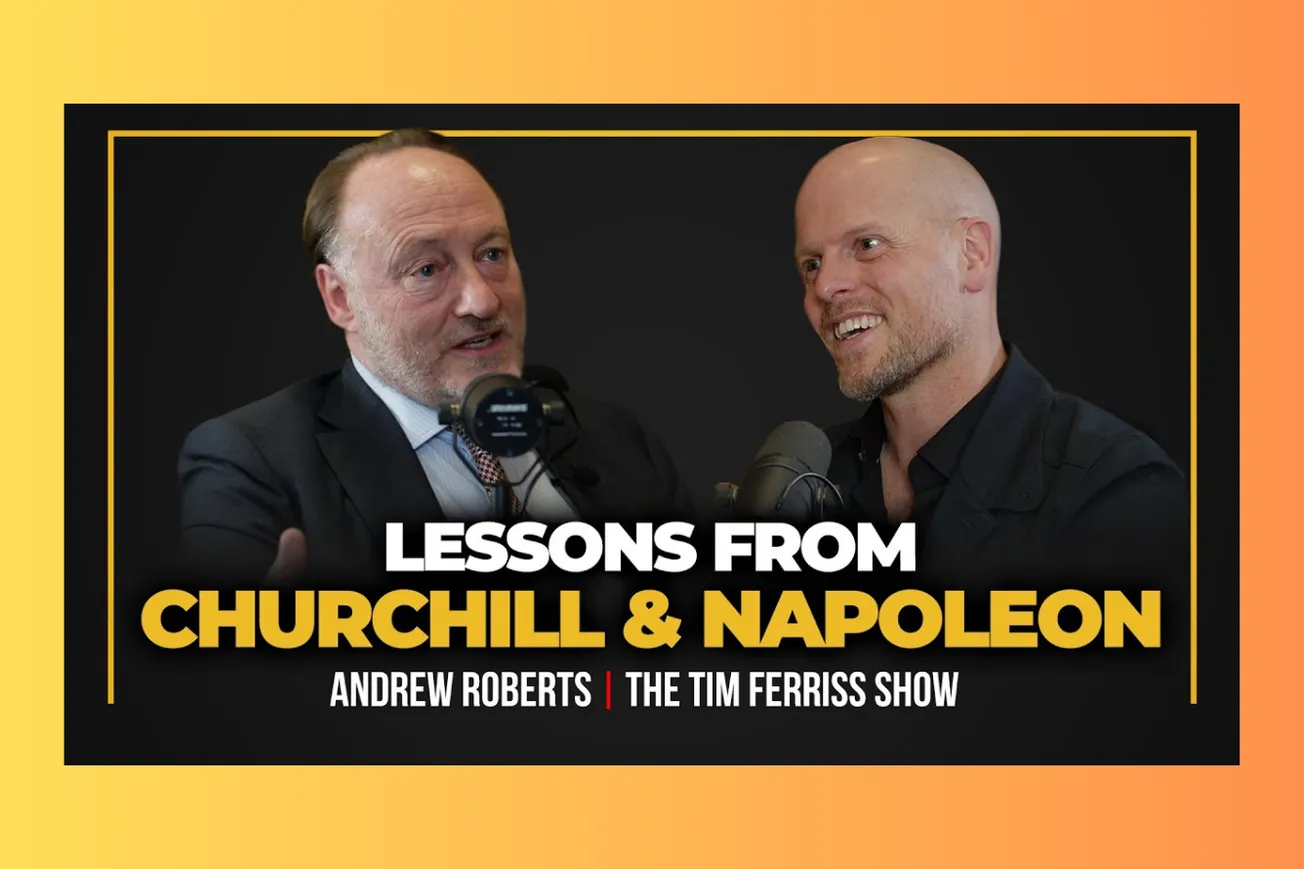Table of Contents
Historian Andrew Roberts shares insights from decades studying Churchill and Napoleon, revealing timeless leadership principles and warning about declining historical literacy threatening Western civilization.
Key Takeaways
- Great leaders like Churchill and Napoleon developed steady nerves through military education and intellectual preparation, not innate talent
- Historical writing demands eliminating hedging words like "perhaps" and "maybe" to maintain reader trust and authority
- Napoleon's core system revolutionized warfare by creating mini-armies that could march separately but converge for battle
- Churchill's resilience stemmed from early rejection by parents, teaching him to bounce back from repeated failures
- Britain's pride in its history has plummeted from 86% to 56% since 2015, signaling dangerous national self-doubt
- Teaching history through narrative storytelling, not dates and facts, creates lasting engagement and understanding
- Collaboration in writing requires mutual respect and complementary expertise, as demonstrated in Roberts' work with General Petraeus
- Modern historical education suffers from "Henry to Hitler" syndrome, skipping crucial centuries of development
The Making of a Historian: From Expulsion to Expertise
- Roberts' unconventional path began with expulsion from Cranley School for drunken building climbing, leading his wife to joke that "all Andrew's done since in life is to get drunk and social climb." This early rebelliousness foreshadowed his willingness to challenge historical orthodoxies throughout his career.
- His recruitment by MI6 at Cambridge involved bizarre tests including arranging British nobility in order of social precedence, with questions designed to identify candidates lacking conventional kindness. The interviewer placed a tick when told Roberts wasn't particularly kind, revealing intelligence services valued ruthlessness over compassion.
- Christopher Perry, his prep school history master, revolutionized Roberts' understanding by teaching history as narrative drama rather than memorized dates. Perry would sit cross-legged on tables, voicing different historical characters and requiring students to memorize 300 dates per term with 99% accuracy through pure inspiration.
- This theatrical approach to historical education created lasting engagement because it treated history as "the most exciting story you're ever going to hear" with the "extraordinary added advantage of being completely true." Modern educational approaches often fail by prioritizing analysis over narrative excitement.
- Roberts credits his father's influence in fostering early historical interest through castle visits and counterfactual discussions during family trips. This early exposure to "what if" scenarios developed his ability to think critically about historical causation and alternative outcomes.
- The transformation from expelled student to respected historian demonstrates how unconventional paths can lead to expertise when combined with genuine passion and rigorous self-education. Roberts' autodidactic approach mirrors Churchill's own intellectual development as a young officer in India.
The Craft of Historical Writing: Precision Over Hedging
- Roberts maintains strict discipline against hedging words like "perhaps," "maybe," and "probably," viewing them as "cheat words" that signal insufficient research to readers who have invested in his books. This approach demands definitive statements backed by solid evidence.
- When uncertain stories must be included for character illumination, Roberts employs specific phrases like "it is said that" or "anecdotally people stated that" to signal readers about questionable veracity. This maintains transparency while preserving valuable historical color and personality insights.
- The bond of trust between historian and reader requires absolute confidence in presented facts, making hedging language a fundamental betrayal of professional responsibility. Readers purchasing books for forty dollars deserve authors who know their material completely rather than tentative speculation.
- Roberts' writing process involves intense focus sessions lasting up to three days without showering when tackling complex historical periods like May 10, 1940. This immersive approach prevents losing the intricate connections between rapidly developing events and multiple decision-makers.
- His collaboration with publisher Stuart Profitt involves receiving one hundred pages of detailed questions and criticisms for every hundred pages submitted. Profitt's nitpicking includes queries like "how wide was the river Po in 1796?" and "did Napoleon take Herodotus to Egypt?" These seemingly pedantic questions ensure readers' potential curiosities are addressed.
- The revision process requires willingness to accept painful feedback, including Profitt's devastating question about a joke: "are you sure this joke is funny?" Such brutal honesty, while emotionally difficult, ultimately produces superior historical writing that serves readers rather than authors' egos.
Napoleon's Military Genius: Innovation Through Study
- Napoleon's success stemmed from combining inspiration with perspiration, dedicating enormous time to studying warfare and implementing ideas from military theorists like the Comte de Guibert, whose 1772 strategic writings Napoleon put into practice thirty years later during his campaigns.
- The revolutionary core system divided armies into mini-units capable of independent movement but coordinated concentration for battle. One corps would engage the enemy while others maneuvered for envelopment, creating tactical flexibility that overwhelmed traditional linear formations used by opponents.
- Napoleon's psychological warfare included dramatic gestures like removing his own medals to award battlefield heroes and delivering inspiring proclamations such as "forty centuries look down upon you" before the Battle of the Pyramids. These actions connected soldiers to historical greatness and elevated their sense of purpose.
- His approach to leadership balanced cutting-edge tactical innovation with old-fashioned appeals to soldiers' souls, understanding that victory alone couldn't sustain morale during difficult campaigns. This combination of intellectual sophistication and emotional intelligence separated him from purely technical commanders.
- The core system's effectiveness is demonstrated by the fact that Napoleon's enemies couldn't defeat him until they adopted his innovations themselves. This pattern of military evolution shows how tactical advantages provide only temporary superiority until opponents adapt and counter-innovate.
- Even during his final campaigns when resources were limited, Napoleon continued winning battles through superior tactical thinking, winning five victories in seven days during the 1814 campaign despite being outnumbered and fighting defensively around Paris.
Churchill's Resilience: Lessons in Learning from Failure
- Churchill's extraordinary resilience developed through early parental rejection, with his father despising him and his mother essentially ignoring him throughout his youth. This emotional abandonment taught him to bounce back from setbacks that would devastate individuals accustomed to consistent support and validation.
- His philosophy on youth and mistakes, articulated in "My Early Life," emphasized that people forgive errors made between ages twenty and twenty-five, with serious judgment beginning only at thirty when promise must translate into achievement. This perspective encouraged risk-taking during formative years.
- Churchill learned from every major mistake throughout his career, including the Dardanelles disaster, the gold standard decision, the abdication crisis, and his stance on Indian independence. His democratic environment forced him to defend these decisions publicly, creating accountability that prevented hubristic repetition of errors.
- His military education and early combat experience provided intellectual framework for handling escalating responsibilities as his command authority grew. Both Napoleon and Churchill studied ancient commanders like Julius Caesar and Alexander the Great, developing historical perspective on leadership challenges.
- The concept of "Holy Fire" drove both leaders - a spiritual belief that their missions were so important and necessary that they couldn't be kept awake at night even by friends' deaths for which they bore responsibility. This psychological defense mechanism enabled decisive action during crises.
- Churchill's extensive reading during his early military service, particularly Gibbon and Macaulay, shaped both his writing style and philosophical outlook based on Whig principles of noblesse oblige - the duty of privileged individuals to work for the greater good of their communities.
The Decline of Historical Consciousness
- British pride in national history has collapsed from 86% in 2015 to 56% currently, representing a catastrophic loss of collective confidence that Roberts attributes to sustained attacks on the British Empire's legacy without acknowledging its role in abolishing slavery and promoting human progress.
- Modern British education suffers from "Henry to Hitler" syndrome, jumping from Tudor period directly to World War II while skipping crucial centuries including the Civil War, Hanoverian period, American Revolutionary War, and industrial development that shaped modern Britain and global civilization.
- Survey data reveals profound historical ignorance among British teenagers, with 23% believing America won the War of Independence, 20% thinking Winston Churchill was fictional, and similar percentages believing Sherlock Holmes and Eleanor Rigby were real historical figures.
- The removal of Thomas Jefferson's statue from New York City Hall exemplifies what Roberts calls "cultural suicide" - refusing to honor founding fathers despite their monumental achievements because of personal flaws like slave ownership that were common to their era.
- University enrollment in history programs continues declining while political pressure mounts to present imperial history exclusively through lens of exploitation and oppression, ignoring genuine humanitarian motivations that drove many administrators, missionaries, and explorers in later imperial periods.
- Roberts argues that losing pride in ancestral achievements makes it impossible to feel optimistic about national futures, creating self-fulfilling prophecies of decline as societies lose confidence in their values and institutional foundations.
The Art of Historical Collaboration and Research
- Roberts' successful collaboration with General David Petraeus on "Conflict: The Evolution of Warfare from 1945 to Ukraine" succeeded because of mutual respect and complementary expertise, with Petraeus providing command-level insights that Roberts couldn't access through traditional historical research.
- The partnership worked because Petraeus could place himself mentally in the position of commanders like Matthew Ridgway in Korea, offering perspectives on decision-making under extreme pressure that purely academic historians cannot replicate through archival research alone.
- Roberts maintains daily diary writing as morning routine in pajamas and slippers, recording interesting conversations and events in maximum 500 words per entry. This practice provides raw material for future books while helping him feel his life isn't "a complete waste of time."
- His diary creates anxiety among friends like Niall Ferguson, who obsesses over what embarrassing remarks might be recorded for future publication. Roberts insists the diary captures wit and intelligence rather than compromising material, though friends remain skeptical about his editorial judgment.
- The writing process demands complete immersion during complex historical periods, with Roberts occasionally going three days without showering when tracking minute-by-minute developments during critical events like Churchill's appointment as Prime Minister on May 10, 1940.
- Stuart Profitt's editorial approach involves questioning every assumption and detail, asking practical questions like river widths and whether historical figures carried specific books. This micro-level scrutiny ensures readers' potential curiosities are anticipated and addressed throughout the narrative.
Common Questions
Q: What made Napoleon such an effective military leader?
A: He combined intellectual study of warfare with psychological understanding of soldiers, using innovative tactics and inspiring leadership.
Q: How did Churchill develop his famous resilience?
A: Early parental rejection taught him to recover from setbacks, while military education provided frameworks for handling responsibility.
Q: Why is historical education declining in Britain?
A: Schools skip centuries of important history and focus primarily on negative aspects of imperial legacy.
Q: What makes Andrew Roberts' writing style distinctive?
A: He eliminates hedging words and presents history as exciting narrative rather than academic analysis.
Q: How should imperial history be taught objectively?
A: By acknowledging both positive and negative aspects rather than assuming all colonial activities were purely exploitative.
Roberts demonstrates that studying great historical leaders provides timeless lessons in crisis management and strategic thinking. His pessimism about declining historical consciousness serves as urgent warning about societies losing connection to their foundational achievements and values.





